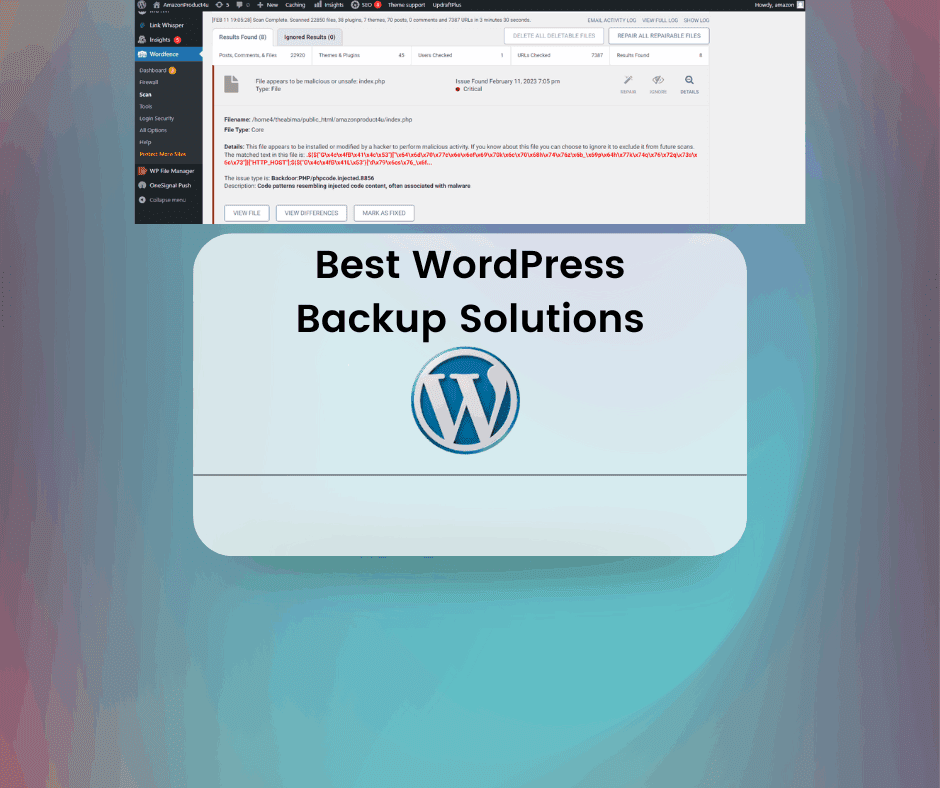“Best WordPress Backup Solutions”
Introduction: In today’s digital world, having a website is crucial for any business or individual looking to establish an online presence. But with the increasing dependence on technology, it’s essential to ensure the safety of the data and information stored on your website. That’s where WordPress backup solutions come into play. In this article, we’ll take a look at the best WordPress backup solutions to protect your website from potential data loss.

Importance of Regular Backups Regular backups are an essential part of maintaining the stability and security of your WordPress website. They provide peace of mind and ensure that your data is protected in case of any unexpected issues. It is recommended to perform backups on a regular basis, such as weekly or monthly, to ensure that you always have a recent copy of your website.
Types of WordPress Backup Solutions There are various backup solutions available for WordPress, including plugins, manual backups, and server backups. Some popular WordPress backup plugins include UpdraftPlus, BackupBuddy, and VaultPress. Manual backups involve exporting your WordPress database and files and saving them to your computer. Server backups are performed by your web hosting provider and typically involve backing up your entire server.
Choosing the Right Backup Plugin for Your Website When choosing a backup plugin for your WordPress site, it is important to consider your specific needs and requirements. Factors such as the size of your website, the frequency of updates, and the level of technical expertise can all play a role in determining the best backup solution for your site. It is also important to consider the cost of the plugin, as well as its reputation and user reviews
I. Importance of Regular Backups A website can be vulnerable to a variety of threats, such as hacking, server crashes, or plugin malfunctions. That’s why it’s essential to perform regular backups of your WordPress site. Regular backups ensure that you have a recent copy of your website that you can quickly restore in case of any unexpected issues. It is recommended to perform backups on a weekly or monthly basis to keep your data safe and secure.
II. Types of WordPress Backup Solutions There are several backup solutions available for WordPress, including plugins, manual backups, and server backups.
A. WordPress Backup Plugins The easiest and most convenient way to perform backups on your WordPress site is by using a backup plugin. Some popular WordPress backup plugins include UpdraftPlus, BackupBuddy, and VaultPress. These plugins offer a variety of features, such as automatic backups, backup scheduling, and file compression, to make the backup process quick and simple.
III. Manual Backups Manual backups involve exporting your WordPress database and files and saving them to your computer. This option is suitable for those who prefer to have full control over their backup process. However, manual backups can be time-consuming and require technical expertise to perform correctly.
IV. Server Backups Server backups are performed by your web hosting provider and typically involve backing up your entire server. This option is suitable for those who prefer to leave the backup process to their hosting provider. However, it’s important to ensure that your hosting provider offers regular server backups to keep your data safe and secure.
V. Choosing the Right Backup Solution for Your Website When choosing a backup solution for your WordPress site, it’s essential to consider your specific needs and requirements. Factors such as the size of your website, the frequency of updates, and your level of technical expertise can all play a role in determining the best backup solution for your site. It’s also important to consider the cost of the solution, as well as its reputation and user reviews.
VI. Setting up a Backup Schedule Once you’ve chosen the best backup solution for your WordPress site, the next step is to set up a backup schedule. This involves deciding how often you want to perform backups and ensuring that the backup process is automated. A weekly or monthly backup schedule is recommended to keep your data safe and secure.
V. Tips for a Successful Backup and Restore To ensure a successful backup and restore process, it’s essential to follow these tips:
- Store your backups in a secure location, such as an external hard drive or cloud storage service.
- Regularly check your backups to ensure they are working as expected.
- Test your backup and restore process regularly to ensure it works as expected in case of any unexpected issues.
- Keep your backup plugin or solution up to date to ensure it continues to work effectively.
Free WordPress Backup Plugins:
- UpdraftPlus: This plugin is one of the most popular free backup plugins for WordPress, offering both manual and scheduled backups.
- BackWPup: This plugin offers both free and premium versions, with the free version providing features such as database backups and file backups.
- WP Database Backup: This simple and easy-to-use plugin allows you to schedule regular backups of your WordPress database.
- Jetpack Backup: This plugin is a part of the Jetpack plugin suite and offers real-time backups and disaster recovery for your WordPress site.
Paid WordPress Backup Plugins:
- BackupBuddy: This premium plugin offers a wide range of backup options, including manual backups, scheduled backups, and cloud-based backups.
- VaultPress: This paid plugin offers real-time backups and automatic restores, as well as security scans and malware removal.
- BlogVault: This paid plugin offers real-time backups, automatic migrations, and the ability to manage multiple WordPress sites from one dashboard.
- BackupGuard: This premium plugin offers a wide range of backup options, including manual backups, scheduled backups, and cloud-based backups.
When choosing a backup solution for your WordPress site, it’s important to consider the specific features that you need and your budget. Free plugins can provide a basic level of protection, while paid plugins typically offer more advanced features and greater reliability.
Conclusion:
In conclusion, regular backups are essential for protecting your data and maintaining the stability of your WordPress site. There are several backup solutions available for WordPress, including plugins, manual backups, and server backups, each with their own pros and cons. When choosing a backup solution, it’s essential to consider your specific needs and requirements. With the right backup solution and a well-executed backup schedule
FAQs:
Q: What is a WordPress backup solution? A: A WordPress backup solution is a tool or method used to backup the data and files of a WordPress website. This ensures that a recent copy of the website is available in case of any unexpected issues, such as hacking, server crashes, or plugin malfunctions.
Q: Why is it important to perform regular backups? A: Regular backups are important because they ensure that a recent copy of your website is available in case of any unexpected issues. This helps to minimize the risk of data loss and maintain the stability of your website.
Q: What are the different types of WordPress backup solutions? A: The different types of WordPress backup solutions include plugins, manual backups, and server backups. Each type has its own pros and cons, and it’s important to choose the best solution based on your specific needs and requirements.
Q: Which is the best WordPress backup solution? A: The best WordPress backup solution will depend on your specific needs and requirements. Factors such as the size of your website, the frequency of updates, and your level of technical expertise can all play a role in determining the best solution for your site.
Q: How often should I perform backups? A: It is recommended to perform backups on a weekly or monthly basis to keep your data safe and secure.
Q: What should I consider when choosing a backup solution for my WordPress site? A: When choosing a backup solution for your WordPress site, it’s essential to consider factors such as the size of your website, the frequency of updates, and your level of technical expertise. It’s also important to consider the cost of the solution, as well as its reputation and user reviews.
Q: What steps should I follow to ensure a successful backup and restore process? A: To ensure a successful backup and restore process, it’s essential to store your backups in a secure location, regularly check your backups, test your backup and restore process, and keep your backup solution up to date.










![Download AnyWhere Elementor Pro for Free [v2.26.2]: Enhance Your Elementor Pro Experience](https://fhdtech.com/wp-content/uploads/2024/01/Elementor-Pro-Free-Download-3.18.2-Pro-Templates_-8.png)

![Piotnet Addons For Elementor Pro Download For Free [v7.1.23]](https://fhdtech.com/wp-content/uploads/2024/01/Elementor-Pro-Free-Download-3.18.2-Pro-Templates_-7.png)
Leave a Comment